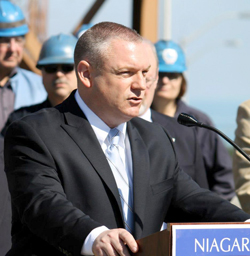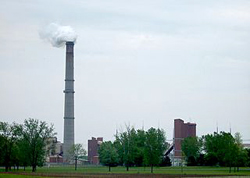Dyster Stance Seen as Threat to Somerset Coal Plant
By Craig Tretiak
Niagara Falls Mayor Paul A. Dyster has always fancied himself a social activist, whose commitment to big-ticket issues extends well beyond the benighted environs of Niagara County.
Dyster managed to insert himself into the gun control debate earlier this year appearing in a commercial paid for by New York City Mayor and soda size regulator Mike Bloomberg. That stunt left the mayor unwelcome at any of the myriad rod and gun clubs in Western New York.
Now, it's Dyster's commitment to all things green that has managed to alienate several local government and business leaders on the eastern end of Niagara County.
It seems that the socially conscious mayor managed to headline at an April press conference in Buffalo organized by the Sierra Club, the WNY Peace Center, PUSH Buffalo, and the Riverside-Salem United Church of Christ to push wind power as the green alternative to polluting fossil fuels.
According to the Sierra Club's press release announcing Dyster would headline the event, "At a time when the state's remaining coal plants are increasingly uneconomical, the 'Let's Turn, Not Burn' campaign is asking [Gov. Andrew Cuomo] to use his administrative power to bring job-creating renewable energy online to replace outdated coal, gas and nuclear plants."
That doesn't sit well with officials of Upstate New York Power Producers, Inc., the company operating the former AES Somerset coal plant in Somerset. It doesn't seem to sit well with the elected officials who represent Somerset, either.
Somerset Supervisor Daniel Engert told the Niagara Falls Reporter he considered Dyster's participation in the press conference, which urged the closure of Western New York's coal plants, including the Somerset plant that employs more than 100 of his neighbors, "disappointing, damaging, just plain ill-focused and dumb for our region."
John Syracuse, who represents Somerset in the County Legislature, called the move "a sucker punch."
Dyster wasn't alone at the Sierra Club press conference. He shared the podium at the event with Cornell University professor Robert Howarth.
How influential is Howarth? So much so that, in his Jan. 6, 2012 "Reflections" commentary for Radio Cadena Agramonte, former Cuban dictator Fidel Castro cited Howarth's work and gave it the communist equivalent of two thumbs up.
Dyster's compatriot is well versed in matters related to the science behind global climate change. Just last month, Howarth's Cornell University web page offered up enlightening scientific data including an article titled "Adding Veggies to Your Diet Helps Cut Global Warming."
While Engert and Syracuse don't boast any Cornell professors on their side, the pair was joined at a recent press event in Somerset by U.S. Rep. Chris Collins, State Sen. George D. Maziarz, Assemblywoman Jane Corwin, Somerset plant manager Jack White, and IBEW Local 966 President Mike Lutz.
All said they were outraged by Dyster's participation in the Sierra Club-backed anti-coal stunt.
"We have enough economic and jobs issues in this area, and we don't need someone out there actively trying to drive existing businesses out," White told us. "I have just under 100 unionized workers, plus management and staff, making an average wage on the order of $30 an hour. These are good jobs, and these are mostly family men and women trying to take care of their kids and pay their mortgages."
White is also bemused by Dyster's call for eliminating coal production—which, he notes, is extremely clean thanks to modern scrubbers that remove pollutants before exhaust leaves the power plant's massive smokestack—when there are no viable alternatives to replace the amount of electrical generation that would be lost.
"It's disappointing we have people trying to shutter a needed power generation plant," White said. "We are providing power that is competitive in the marketplace, that is reliable, and that relies heavily on environmental planning and mitigation."
Last month, management and labor at the Somerset plant stood shoulder-to-shoulder to put pressure on Cuomo to backtrack on a commitment by state regulators to buy low-cost hydropower from a government-subsidized, state-run power monopoly in Quebec.
Plant manager White and union head Lutz were joined in that effort by leaders from every level of government, from the town of Somerset to the U.S. Congress.
The word is that supporters of the embattled coal plant plan to push back against Dyster and his call for eliminating the Somerset plant and its roughly 100 jobs.
"Mayor Dyster is trying to pick losers and winners," Engert said. "In this case, the losers would be the entire fleet of Western New York coal plants—us in Somerset, the NRG plant in Dunkirk, the Huntley plant in Tonawanda, and the Cayuga plant in Lansing—not to mention the men and women who operate them and the communities they are located in. That's a lot of jobs and a lot of economic impact."
Engert points to one economic impact study that found that the four Western New York coal plants had a $500 million impact on the local economy.
"The Somerset plant is, and long has been, Niagara County's single largest taxpayer," Engert said, a fact frequently driven home by the former AES operators of the plant. "But that $500 million figure goes well beyond that—it includes the wages and salaries of the workers, the indirect employment from suppliers and support industries."
While Dyster did not directly say that local factories should be immediately closed, his support of the event and the Sierra Club's position leaves little room for doubt: If the plan Dyster and others gathered to support were to be implemented tomorrow, Somerset and others would have to close down today.
Lynda Schneekloth, a Sierra Club Niagara board member and a professor in the University at Buffalo's planning department, said governments need to act quickly to mitigate the effect burning fossil fuels have on the earth's climate.
"We have to do it now," Schneekloth said. "We can't wait 10, 15, 20 years to do it. We actually have to do it now."
For his part, Mayor Dyster told the Reporter the idea behind the Sierra Club effort "is to encourage the governor to meet and extend the state's renewable energy goals" beyond the 30 percent by 2015, a target that according to a recently released study could create more than $6 billion in direct economic benefits to the state.
"We are at 23.4 percent already," Dyster said.
In his remarks at the Sierra Club event, the mayor said: "Niagara Falls was in the forefront of renewable energy a century ago with the creative development of hydroelectricity. It's time we reclaim that advantage and aggressively push for clean, renewable energy here in New York."
By aggressive, Dyster's opponents are probably not wrong in interpreting, he means closing Somerset and other plants and getting taxpayer subsidies to open other kinds of businesses.
Syracuse, who voted in favor of several economic development projects that have benefited the City of Niagara Falls, including a county IDA-brokered deal with Globe Specialty Metals that the Dyster Administration sought backing for, said he takes Dyster's attack on the Somerset plant personally.
"In politics, we overuse the word constituents," Syracuse said. "The people who work at that plant aren't just my constituents. They're my neighbors and my friends. They're the people I go to church with on Sundays."

